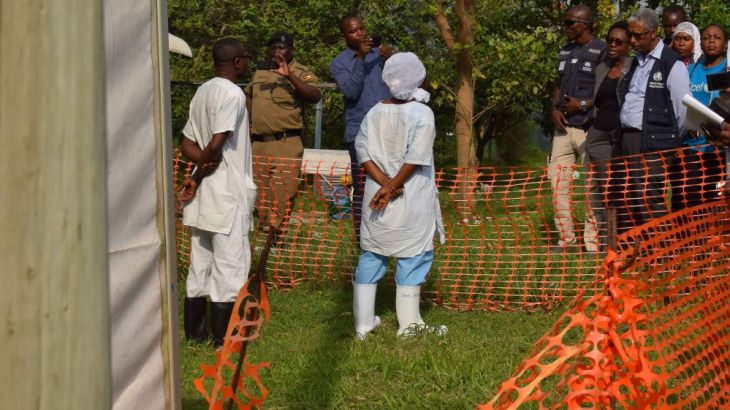Uganda bans public gatherings in Kasese district amid Ebola fears
Move comes as health officials declare second Ebola fatality in Uganda just days after the virus spread from DR Congo.

Uganda has banned public gatherings in western Kasese district as officials attempt to contain an Ebola outbreak which has killed two people in the country days after the virus spread from the neighbouring Democratic Republic of the Congo (DRC).
Emmanuel Ainebyona, a Health Ministry spokesman, confirmed the move on Thursday hours after officials declared that a 50-year-old Congolese woman had become the second patient to die of the disease in Uganda.
Keep reading
list of 4 itemsUganda declares end of Ebola after 4-month outbreak
Uganda’s Ebola outbreak nearly under control, says Africa CDC
Ebola vaccines produced lasting antibodies during trial: Studies
Her five-year-old grandson was the first confirmed Ebola death in Uganda. The boy’s three-year-old brother is also infected and is currently undergoing treatment.
The three individuals were part of a family group that travelled to DRC to care for a relative, who also died of Ebola, before returning to Uganda.
The infections marked the first confirmed cross-border cases of the virus in the current epidemic, which was previously confined to the eastern DRC’s North Kivu and Ituri provinces after emerging 10 months ago.
More than 2,000 cases have been recorded in the DRC since the start of the outbreak in August, the country’s 10th to date, and more than 1,400 people have died.
An expert World Health Organization (WHO) committee will convene in the Swiss city of Geneva on Friday to weigh whether to declare the epidemic a global health emergency following its spread into Uganda. Such declarations almost always boost global attention and lead to an increase in aid.
Two previous WHO emergency meetings decided the outbreak was not yet fit for a declaration of global emergency despite being of “deep concern”.
DRC repatriates five patients
Ugandan Health Minister Jane Ruth Aceng said as of Thursday afternoon there was “no confirmed case” of the Ebola virus in the country after DRC officials succesfully repatriated five infected people earlier in the day.
Three people suspected to have contracted the disease are being treated in isolation at the Kasese district’s Bwera Ebola Treatment Unit, Aceng added, while health workers were establishing contact with 27 people believed to have come into contact with the two deceased.
As of now,there is NO confirmed case of Ebola in Uganda.
However, 3 suspected cases remain in isolation at Bwera Ebola Treatment UnitThe DRC team successfully repatriated five people
We continue to follow up 27 contacts of the deceased index case alongside the 3 suspected cases pic.twitter.com/tMPDWoJ4LQ— Dr. Jane Ruth Aceng Ocero (@JaneRuth_Aceng) June 13, 2019
Uganda and the wider East Africa region have been on high Ebola alert since the start of the epidemic.
In a precautionary move, Uganda has vaccinated some 4,700 health workers in more than 150 facilities with an experimental drug designed to protect them against the virus, which spreads through contact with bodily fluids of those infected, causing haemorrhagic fever with severe vomiting, diarrhoea and bleeding.
Among those vaccinated are the members of a rapid response team who have been deployed to Kasese to trace likely cases and vaccinate those who might have come into contact with any people who have contracted the disease.
The vaccine is experimental but is estimated to be 97.5 percent effective and, according to the WHO, may protect a person for up to 12 months.
‘Not under control’
Experts have long feared Ebola could spread from the eastern DRC to neighbouring countries, with regional insecurity and deep community mistrust hampering emergency responders’ efforts.
More than 100 attacks on treatment centres and health workers in DRC have been recorded since the beginning of this year, according to the WHO.
Last week, the United Nations agency warned that a quarter of all cases in the outbreak may be going undetected, with scores of victims dying without having been admitted to Ebola treatment centres.
Michael Ryan, executive director of WHO’s Health Emergencies Programme, cautioned the epidemic was “not out of control, but it is certainly not under control”.
The world’s worst epidemic of Ebola, a haemorrhagic fever, killed about 11,300 people in West Africa as it raced through Guinea, Sierra Leone and Liberia from 2013 to 2016.